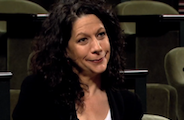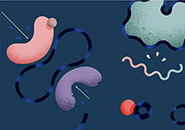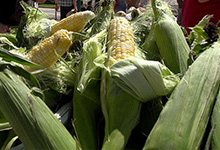
Scientific Discipline
Microbiology
Related Links
Host Institution
University of California, San Diego
Current Research
BioClock Studio: Integrating Circadian Rhythms Research, Education, and Outreach to Change the Landscape of Public Health Policy
Research
Biography
Susan Golden studies the mechanism of the circadian clock in cyanobacteria using Synechococcus elongatus, an organism she helped to develop as the premier model for studying the clock in prokaryotes.
Diverse eukaryotes, and at least one group of prokaryotes—cyanobacteria—use a circadian (24-hour) clock to control physiological events and gene expression. S. elongatus shows a circadian rhythm of bioluminescence when it is transformed with a reporter gene that encodes the luciferase of a bioluminescent marine bacterium or firefly. Golden’s team has used this reporter system to identify components of the circadian system. She was part of a collaboration that showed that three interacting proteins, KaiA, KaiB, and KaiC are at the heart of the cyanobacterial clock.
Her team’s goal is to understand the basic mechanism of timekeeping and how the clock becomes synchronized with the environment and controls cellular processes. Her team is also working to understand how cells inherit a sense of time and to explore the production of biofuels in cyanobacteria.
As a faculty member, Golden has taught specialty and core courses, with enrollments from seven students to 300. She relishes the role of one-on-one mentor, but also appreciates the impact that a positive experience can have on an anonymous student in a stadium-sized room.
Her “Golden Rule” is to teach as she wished her instructors had taught: with clarity and transparency. Golden says she tries to empower students to have a role in determining their grade that is not entirely dependent on performance on a given day on a given exam. She aims to allow flexibility of when, how, and at what pace they complete assignments; and to provide feedback as frequently and liberally as is practical.
Golden says her teaching career began while she was an undergraduate at Mississippi University for Women. She realized that some students couldn’t grasp scientific concepts as easily as she could – and she signed on to tutor a classmate. In the decades since, she has mentored scores of diverse students at the undergraduate, graduate, and postdoctoral levels.
At UCSD, she is the Director of the Center for Circadian Biology, where she teaches Introductory Biology and an undergraduate class entitled Circadian Rhythms – Biological Clocks. She is a member of the Faculty of 1000 Biology, a fellow of the American Academy of Microbiology, and member of the National Academy of Sciences.



